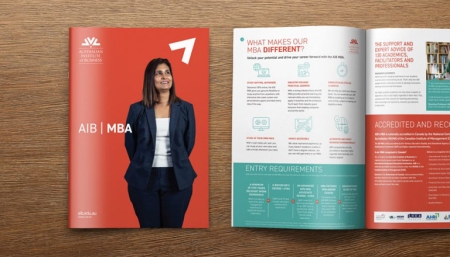Is an MBA right for me? MBA career outcomes

Choosing to pursue an MBA isn’t a decision to be taken lightly – it’s an important life choice that can affect the direction and success of your career. So it’s understandable if you need to take the time to question the value and ask yourself if an MBA is worth the investment.
If you’re dreaming about accelerating your career, you’re not alone in wondering if an MBA is a suitable pathway to your professional goals. Read on to discover if an MBA is right for you, and its career outcomes.
What is an MBA?
The world’s most popular postgraduate management degree, MBA stands for Master of Business Administration.
An MBA will give you a holistic view of how business works in areas such as:
- Marketing
- Finance
- Accounting
- Human resource management
- Strategic management
- LogisticsLeadership
- Operations management
- Project management
Not only will you graduate with fundamental management knowledge, but you also gain in-depth knowledge in these areas while developing industry-specific skills.
Learn more about our AIBv MBA and how it can benefit you.
Is an MBA right for me?
An MBA can enhance your job opportunities, increase your salary and boost your career, but it takes dedication, discipline and support. Before you decide if an MBA is right for you, it’s essential to ask yourself some questions.
Do I feel stuck in my career?
Ambition is the perfect trait for anyone who wants to excel in their industry, but what should you do if your career plateaus? You may need to consider your next actions to stand out from your colleagues – is it taking on additional responsibility? Managing more projects? Or is it engaging in extra meetings with management? Even so, there’s no guarantee that your seniors will appreciate or value all your hard work.
An MBA puts you ahead of your competitors and gives you more credibility and authority in your sector. Think of an MBA as a key to a door that opens to new and exciting career opportunities.
Do I have the right marketable skills?
In 2021, Hays Australia conducted a study involving nearly 3,500 employers. They discovered that 96% of the people surveyed considered soft skills to be either more important or equally important to a candidate’s hard or technical skills. 81% claimed that problem-solving was the most important skill, while 79% believed it was communication. This was followed by adaptability (70%), critical thinking (63%) time management (60%) and emotional intelligence (53%).
Being in the same company for years has its perks – you are perceived as an industry expert, you are well-known in the community and you have plenty of expertise to spare. However, it can dull any other skills you’ve long forgotten about.
An MBA helps you acquire highly regarded abilities that are extremely valuable to hiring managers and recruiters, such as critical thinking, communication and problem-solving.
Read ‘What skills will an MBA give you?’.
Do I know what my dream job is?
Evaluate your strengths, weaknesses and experiences with previous job positions. Consider the kind of environment you thrive in, and speak to people in more senior roles than you. You can even examine your current hobbies, interests or anything else that drives you. This will help you determine what your dream job is.
Now look up the credentials the people in your perfect career have. Do they have MBAs or any other degrees? More than likely they didn’t wait for someone to notice their drive – they decided to take the next step and back up their extensive experience with a formal qualification.
An MBA can give you the leg up you need to land that dream job in almost any industry. If you’re aspiring toward a career in marketing, management, finance or even considering starting your own business, then an MBA is the right choice for you.
What are the MBA career outcomes?
C-suite positions
C-suite, which is sometimes referred to as C-level, refers to a company’s top management positions, where the ‘C’ stands for ‘chief’. Common c-suite executive titles include:
- Chief Executive Officer (CEO)
- Chief Financial Officer (CFO)
- Chief Operating Manager (COO)
- Chief Infomation Officer (CIO)
- Chief Compliance Officer (CCO)
- Chief Human Resources Manager (CHRM)
- Chief Security Officer (CSO)
- Chief Green Officer (CGO)
- Chief Analytics Officer (CAO)
- Chief Marketing Officer (CMO)
- Chief Data Officer (CDO)
These are a corporation’s most important and respected senior executives. And while these roles require an in-depth understanding of the industry as well as a wide range of soft skills such as leadership and communication, they also provide extremely lucrative compensation packages.
Indeed claims that a C-suite position can earn between $83,362 to $182,635 per year.
Increased salary
Whatever the reason is for undertaking an MBA, there’s no denying that receiving a higher salary is a strong motivation. According to our most recent Alumni Insights Report, 73% of all AIB students received a pay increase since beginning our MBA program. And another 74% increased their salary since graduating. On average, this salary increase was a minimum of $34,000.
Change of industry
An MBA is an excellent option for those looking to broaden their horizons and transition out of a niche industry. That’s because an MBA gives students access to a wide variety of experiential education opportunities that allow them to experiment with different business roles.
At AIB, our MBA is designed to encourage career exploration with a variety of courses that offer a broad selection of learning outcomes. And best of all, you’ll be learning alongside the industry’s finest – expanding your network and building relationships before you’ve even stepped into your new role.
Delivered online with continual updates, innovations and new releases, the AIB MBA offers genuine flexibility, industry insights, practical skills and the support you need to achieve your goals in our fast-changing world. It’s created for people just like you. Learn more about it.





